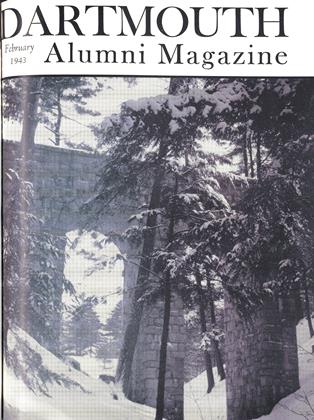Philip S. Marden's Musings Show Clarity, Humor, Grace; Dartmouth Provides Locale for Crime Club Book
by Philip SanfordMarden '94. Courier Citizen Co., Lowell,Mass., 1940, pp. 275. $2.00.
PHILIP SANFORD MARDEN, former alumni trustee and now an associate editor of this MAGAZINE, has been a life-long journalist and was for forty years editor-in-chief of the LowellCourier Citizen. In addition, he has interrupted his editorial duties by extensive travel, which found later expression in five informed and well-written books on Greece, Spain, Egypt, the Caribbean, and Portugal. These experiences have taught him how to write and have filled his mind with facts and his life with abundant interests.
The twenty-seven sketches included in the volume under review appeared originally as Saturday articles in the Courier Citizen over the name of Phineas Maddox. If Maddox were asked their content, being a lover of Latin, he would undoubtedly reply with Juvenal: quidquid. agunt homines—nostri est farrago libelli. The scope is wide; random musings on homely themes which have universal appeal: the epicure ordering a dinner; manners, marriage, and divorce of modern youth; the human longing for decorations and honorary degrees; the passing of red flannel chest-protectors; the home library; Socrates and the hemlock with apologies for his accusers; in defense of uncles; fun with the pseudo-science of pedagogy and the advanced science of Eddington; the microbes and streptococci of the old school dipper; etc., etc.
The author, who admits somewhere a partiality for the writers of an earlier day, calls his sketches whimsies—a designation which does not do them full justice unless he uses whimsy in a sense applicable to the Essays ofEtia or the De Coverley Papers. For at times he shows, in a thoroughly modern adaptation, a like quaintness of conceit, delicacy of touch, and exquisite humor, which claim kinship with Lamb and Addison. In more robust vein, Tympani Alley, or the Boston symphony as a cure for insomnia, could have come from the pen of the Stephen Leacock of Homer andHumbug; and his recollections of childhood throughout remind one of Mark Twain.
On the breadth of his information and the form in which it appears Dr. Johnson is twice quotable. "All knowledge is of some value. There is nothing so minute or inconsiderable that I would not rather know it." Phineas Maddox has slept with this aphorism and ranges confidently from ancient Egypt and legendary Cadmus to modern trends in science and silk toppers. And again the old lexicographer: "Whoever wishes to attain an English style familiar but not coarse, elegant but not ostentatious, must give his days and nights to the volumes of Addison." Maddox would deprecate this juxtaposition with the great Addison, naturally; but the diction of these sketches is a delight. The author has an abiding love and reverence for words. It would be a good penetential exercise for any modernist to read these causeries and try to imitate their clarity and easy grace.
Mr. Marden speaks of his volume as escapist literature for a war-torn world. In the best sense this is true. It is recommended reading for this or any other world.
 View Full Issue
View Full Issue
More From This Issue
-
 Article
ArticleSulzberger Addresses 1943
February 1943 -
 Article
Article'Round the Girdled Earth
February 1943 By Herbert F. West '22. -
 Article
ArticleColleges Will be Used for Military Training
February 1943 By LLOYD K. NEIDLINGER '23 -
 Article
ArticleGovernment War Work
February 1943 -
 Class Notes
Class Notes1939
February 1943 By RICHARD S. JACKSON -
 Class Notes
Class Notes1929
February 1943 By F. WILLIAM ANDRES
Books
-
 Books
BooksAlumni Articles
JUNE 1967 -
 Books
BooksGRANITE LEDGES
June 1943 By Francis L. Childs '06 -
 Books
BooksCELEBRITIES AT OUR HEARTHSIDE.
June 1960 By HERBERT F. WEST '22 -
 Books
BooksA GERMAN GRAMMAR
December 1935 By R. H. Lanphear '25 -
 Books
BooksIntolerable Ambiguity
November 1980 By R. H. R. -
 Books
BooksALUMNI PUBLICATIONS
December 1918 By WILLIAM SKINKLE KNICKERBOCKER

